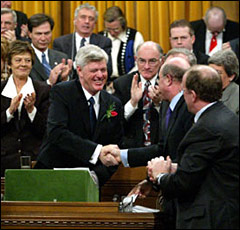Posted Sep. 1/05
Previous: Contact us
For many Members of Parliament whose ridings are far from Ottawa, much time is spent zipping across the country on planes rather than spending precious time with loved ones. In the capital, MPs toil in the microcosm that is Parliament Hill for months on end, getting swept up in the intricacies of what can be a very stressful job.

- John Manley, BA/71, delivers the federal budget in 2003 during his time as federal Minister of Finance.
But there is another, less obvious challenge that MPs deal with every day, says John Manley, BA/71, former Deputy Prime Minister of Canada who represented the riding of Ottawa-South for 16 years.
“There is relentless criticism from the media,” he says from his law office in Ottawa where he is currently a member of McCarthy Tetrault’s senior counsel.
“If you’re a public figure, especially if you’re in Cabinet, you develop the ability to ignore a lot of (the criticism). But it doesn’t make it a healthy place to work. It’s just plain tough. When you’re the one who’s on the line, you develop a fairly thick skin.”
It’s this kind of challenge, Manley says, that can prevent good people from entering politics. For others, the opportunity to achieve change is worth the potential strain on one’s private life and public reputation, he says.
According to Manley, the best way for federal politicians to create change really depends on their vantage point in the House of Commons. Cabinet ministers have “a lot of power” and “a defined set of responsibilities,” which makes change quite tangible, he says. Manley experienced these responsibilities first-hand when he served as Minister of Foreign Affairs in 2000. Following 9/11, he became Chairman of a new Cabinet Committee on Public Security and Anti-terrorism.
In 2002, Manley was appointed Deputy Prime Minister of Canada, Political Minister for Ontario and Chairman of the Cabinet Committees on Economic Union and Social Union. He became Finance Minister in June 2002 and tabled the government’s budget in February 2003.
Out of his long list of achievements, Manley is proud of the fact that Canada was the first country to connect all of its schools and libraries to the Internet — an initiative that he spearheaded in the 1990s. He is also proud of his involvement in the Smart Border Accord that Canada and the U.S. agreed upon following the 2001 terrorist attacks on New York and Washington. The accord enhanced border security while ensuring cross-border trade remained fluid.
While the results of these initiatives were borne out of Manley’s capacity as a Cabinet minister, he says an MP does not have to be in Cabinet to achieve such things. When the Liberal Party was the Official Opposition and John Turner was the party’s leader, Manley would attend finance committee meetings even though he wasn’t a committee member. He did so because finance was one of his many areas of interest. At every opportunity during these meetings, Manley would raise his hand to ask questions. Gradually, he built a name for himself.
“This was my approach to law as well,” Manley says. “There’s no substitute for building credibility. You can’t assume you have it. You have to build it. Once you’ve built it, then you can have influence. I always felt that backbench MPs were like small-business people: If they were entrepreneurial, if they were focused, they could accomplish things.”
—
Fast fact…
John Manley’s favourite course while attending Carleton was Political Science 100, taught by George Roseme. Says Manley: “I still remember Professor Roseme saying, ‘Politics is ubiquitous and inevitable.’ And it was a reminder that even though I was mainly interested in politics as it was practised in government, that unless you understood political apparatus — how decisions were made and how institutions organized themselves — you probably wouldn’t get very far in life.”